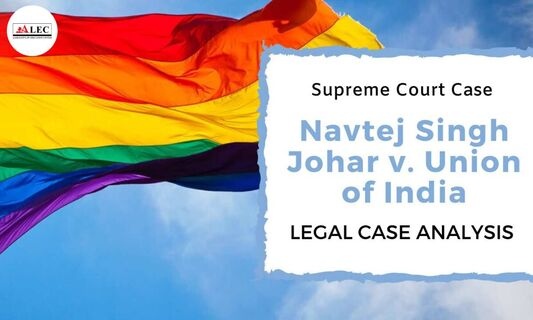Introduction:
Navtej Singh Johar v. Union of India is a landmark case in Indian jurisprudence, where the Supreme Court decriminalized consensual homosexual relations, marking a significant victory for LGBTQ+ rights. The case challenged Section 377 of the Indian Penal Code (IPC), a colonial-era law that criminalized "carnal intercourse against the order of nature," effectively making homosexual acts illegal. This judgment overruled previous rulings and upheld the principles of equality, dignity, and privacy under the Constitution of India.
Background of the Case:
Section 377 was introduced into the IPC in 1861 during British rule, and it criminalized sexual activities “against the order of nature,” primarily targeting homosexual acts. Over time, this section became a tool for harassing the LGBTQ+ community, perpetuating discrimination, and violating fundamental rights.
The first major challenge to Section 377, IPC came in the form of Naz Foundation v. Government of NCT of Delhi (2009), where the Delhi High Court decriminalized consensual homosexual acts between adults. However, in Suresh Kumar Koushal v. Naz Foundation (2013), the Supreme Court overturned this decision, stating that the court did not have the authority to legislate and that only Parliament could amend the law. This judgment reignited the debate on LGBTQ+ rights and set the stage for the Navtej Singh Johar case.
Facts of the Case:
Navtej Singh Johar, a renowned dancer, along with other petitioners, approached the Supreme Court, challenging the constitutionality of Section 377, IPC. The petitioners argued that the provision violated the fundamental rights of LGBTQ+ individuals by criminalizing their identity and consensual sexual activities. The key contention was that Section 377, IPC:
- Violated the right to equality (Article 14),
- Infringed the right to freedom of expression (Article 19),
- Impinged on the right to life and personal liberty, including privacy and dignity (Article 21).
They sought decriminalization of consensual acts between adults in private, arguing that Section 377, IPC disproportionately affected LGBTQ+ individuals, subjecting them to societal stigma and state-sponsored harassment.
Issues Raised:
- Does Section 377, IPC, IPC violate the constitutional rights of LGBTQ+ individuals under Articles 14, 19, and 21 of the Indian Constitution?
- Can a colonial-era law, introduced without consideration of modern constitutional values, continue to hold relevance in a progressive society?
- What is the scope of the right to privacy concerning sexual orientation and consensual relationships?
- Does criminalizing consensual same-sex relations perpetuate stigma and discrimination, and is it constitutionally justified?
Judgment:
The Supreme Court, in a historic judgment on September 6, 2018, unanimously decriminalized consensual same-sex relations between adults by reading down Section 377 of the IPC. The key aspects of the judgment include:
(i) Violation of Fundamental Rights:
The Court held that Section 377, IPC violated Articles 14, 19, and 21 of the Constitution. It recognized that sexual orientation is an innate part of an individual’s identity, and criminalizing consensual relationships based on sexual orientation violates the dignity and personal liberty of LGBTQ+ individuals.
(ii) Right to Equality (Article 14):
Section 377, IPC was deemed discriminatory as it unfairly targeted homosexual relationships. The Court emphasized that equality means non-discrimination and that every individual, regardless of sexual orientation, is entitled to equal protection under the law.
(ii) Right to Privacy and Dignity (Article 21):
Referring to its earlier decision in Justice K.S. Puttaswamy v. Union of India (2017), where privacy was upheld as a fundamental right, the Court observed that consensual sexual relationships between adults are part of the right to privacy. The judgment recognized that sexual autonomy is an essential aspect of personal liberty.
(iv) Freedom of Expression (Article 19):
The Court noted that sexual orientation is an inherent part of self-expression, and the right to express one’s identity, including sexual preferences, is protected under Article 19. Criminalizing same-sex relations curtails this freedom and perpetuates fear, forcing individuals to live in the shadows.
(v)Partial Striking Down of Section 377, IPC:
The judgment clarified that Section 377, IPC would remain applicable to non-consensual acts, acts involving minors, and bestiality. However, consensual sexual relations between adults in private were excluded from the purview of the section.
Impugned Section:
Section 377 of the IPC criminalized "carnal intercourse against the order of nature with any man, woman, or animal." The section, dating back to the 19th century, was rooted in Victorian morality and had been used to prosecute individuals for engaging in same-sex relations. Before the Navtej Singh Johar case, the law was interpreted to criminalize all homosexual acts, regardless of consent, violating individual freedoms and rights.
Impact of the Judgment:
The Navtej Singh Johar judgment is celebrated for its progressive approach to interpreting constitutional rights. It affirmed the dignity of LGBTQ+ individuals and brought Indian law in line with global trends of decriminalizing homosexuality. The ruling also encouraged further activism and legal challenges concerning the rights of LGBTQ+ people in India, fostering a movement toward greater inclusion and equal treatment.
Conclusion:
The decision in Navtej Singh Johar v. Union of India is a milestone in the fight for LGBTQ+ rights in India. By reading down Section 377, IPC the Supreme Court upheld the principles of equality, privacy, and freedom, ensuring that every individual, irrespective of their sexual orientation, has the right to live with dignity and autonomy. It symbolizes a significant step forward in India's journey toward becoming a more inclusive society.
You can also read the Blogs by clicking [Blogs section]
For more information, visit [ALEC Enquiry].

